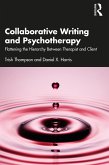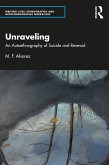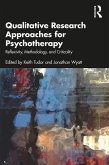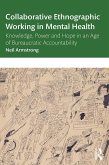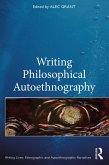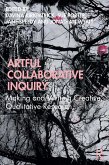Dieser Download kann aus rechtlichen Gründen nur mit Rechnungsadresse in A, B, BG, CY, CZ, D, DK, EW, E, FIN, F, GR, HR, H, IRL, I, LT, L, LR, M, NL, PL, P, R, S, SLO, SK ausgeliefert werden.
"In the spirit of Irvin Yalom's, "Every Day Gets a Little Closer," Trish Thompson and Daniel X. Harris share the ever-deepening richness of their therapeutic journey through poignant, vulnerable, and transparent collaborative writing." -- Lawrence Rubin, PhD, ABPP, Editor, Psychotherapy.net
"Collaboration, accessibility, emotional connection: autoethnography allows all three in the client-therapist relationship. Hierarchies are transcended, healing is transformative. This book shows us how." -- Dr Maria Pallotta-Chiarolli AM, Honorary Fellow, School of Communication and Creative Arts (SCCA), Deakin University, Australia
"This is a provocative intervention in the field of psychotherapy, counselling and qualitative and creative research. Trish Thompson and Daniel X. Harris intimately reflect on the relational processes and intersubjective nature of client-therapist relations as they move from therapist/client to collaborators and co-authors. They demonstrate the transformative power of dialogical practice and creative methods, particularly writing, in their own therapeutic relationship, illustrating how it evolved into a collaboration where their vulnerabilities could be explored in relation to each other, in ways that had therapeutic and transformative benefits for them both. Collaborative Writing and Psychotherapy is a must read for anyone engaged in therapeutic practicing or thinking about the potential power dynamics between therapist and client, and/or ethical possibilities for unsettling tradition notions of client/therapist relationships." -- Professor Katherine Johnson, Professor of Psychology and Dean of Global, Urban and Social Studies, RMIT University, Australia
"This book is a realisation of a beautiful idea. Dan and Trish seek to challenge and dislodge the often unacknowledged power imbalance between client and therapist. Their dialogical process places "equivalence of voice" at the centre of this radical and humanising idea. This book moves me to seriously consider big questions; who am I as I sit in my therapeutic role, who is my client, and what might be possible for two people together in a shared space?" -- Dr Stephen Andrew - Psychotherapist and author of Searching for an Autoethnographic Ethic
"This is a rare gem in the plethora of books written for therapists, giving the reader first-hand experience of using dialogical writing for therapeutic reflection. The book is both rigorously academic and sensitively personal, demonstrating the thought processes and reflexivity of master therapists, reflexivity that all therapists strive for but can rarely achieve." -- Dr Judith Ayre, Head of School of Counselling, Psychotherapy and Arts Therapy, Ikon Institute of Australia



